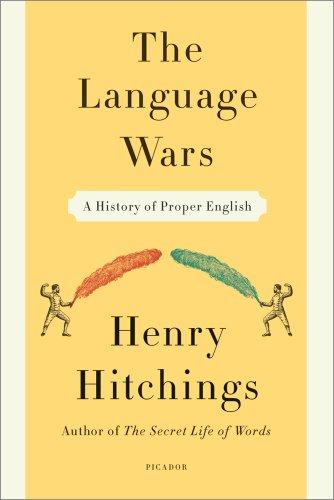
Henry Hitching’s The Language Wars (2011) provides an entertaining history of development of the English Language. Yes, Shakespeare had a big impact on the English Language, but so did Dr. Johnson and Thomas Hobbes. Hitching’s examples of various handbooks and dictionaries show how change in language occurs. My favorite example concerns Webster’s Third dictionary:
“In Rex Stout’s 1962 detective novel Gambit the hero, Nero Wolfe, feeds the pages of this ‘intolerably offensive’ work into a fire. The reason for this topical gesture? Webster’s Third fails to uphold the distinction between imply and infer. Since the two volumes comprised more than 2,700 pages and cost $47.50, Wolf’s was an expensive and time-consuming expression of disgust.” (p. 232)
If you’re interested in England Language history and development, Henry Hitching’s The Language Wars both enlightens and amuses. GRADE: A
TABLE OF CONTENTS:
1 ‘To boldly go’ p. 1
2 The survival machine p. 15
3 The emergence of English p. 26
4 From Queen Elizabeth to John Locke p. 37
5 Hitting le jackpot p. 51
6 The rough magic of English spelling p. 61
7 The many advantages of a good language p. 76
8 ‘Bishop Lowth was a fool’ p. 88
9 O my America, my new found land! p. 104
10 The long shadow of Lindley Murray p. 122
11 The pedigree of nations p. 133
12 Of fish-knives and fist-fucks p. 143
13 ‘Our blood, our language, our institutions’ p. 161
14 Organizing the Victorian treasure-house p. 170
15 The warden of English p. 182
16 ‘Speak that I may see thee’ p. 191
17 Talking proper p. 203
18 The alphabet and the goddess p. 215
19 Modern life is rubbish p. 227
20 Unholy shit p. 237
21 ‘It’s English-Only here’ p. 252
22 The comma flaps its wings p. 261
23 Flaunting the rules p. 270
24 Technology says ‘whatever’ p. 290
25 ‘Conquer English to Make China Strong’ p. 300
26 What do we do with the flowing face of nature? p. 310
27 Such, such are the joys p. 321
28 Envoi p. 333
Acknowledgements p. 337
Notes p. 339
Bibliography of works consulted p. 365
Index p. 391
Sounds like a fun book. Language is never static, but is always changing—especially the English language which is full of words from so many different places and other languages. About 30 years ago, the use of “impact” as a verb was considered bad English. I was a technical writer at the time and our style guide told us to avoid it. Now people talk about something impacting something else and don’t even think about it once being considered incorrect usage. I understand that in the early 20th century, there was a similar complaint about using “contact” as a verb. All part of the rich tapestry of our mother tongue.
Deb, the use of nouns as verbs continues. I’m always hearing people saying they are “tasked” with this activity or that mission.
Someone famously observed, :”Contact is not a verb.”
Dan, Nero Wolfe was adamant about that expression.
In my former writing group, there was a man who placed proper grammar above story or character in a piece of work. That was perhaps taking it too seriously. But, on the whole, I like the rules of grammar obeyed.
Patti, same here. Poor grammar in writing detracts from the reading experience…and annoys me.
Bill Crider would have loved this book. I agree with Wolfe – the misuse of “infer” and “imply” is inexcusable.
And Wolfe added, when questioned, “Contact is not a verb in THIS house!”
Jeff, I’m sure “Contact is not a verb” in a house in Livermore, CA, either.
Just please take away ending sentences with the word “at”. Example: Know where you are, not know where you’re at. That drives me nuts, and seems to be becoming common usage. BAH!
Rick, you’re right about “at” becoming more popular at the end of sentences. Double BAH!
My favorite ranter on the fad of nouns turned into verbs is Donald Vroon in the pages of American Record Guide, which he edits.
Art, I’m always amused at Donald Vroon’s rants in AMERICAN RECORD GUIDE…and his occasionally acidic record reviews.
Does this author also discuss the differences between American and British English?
I prefer to write in “British” like colour etc (learned it at school) – but somehow I defined my spell checking as US – so I often get errors i e red lines.
Now the crazy side of this:
Sometimes I know that there are different words/expressions for something there – but I forgot which is which.
Wolf, there are books that compare the differences between American English and British English like British to American English: A Dictionary and Guide to the English Language
by Andrew William.
https://www.amazon.com/British-American-English-Dictionary-Language/dp/1548640077/ref=sr_1_1?crid=1RYXA8PQFKD35&keywords=british+english+to+american+english+translation+book&qid=1575920840&s=books&sprefix=british+eng%2Caps%2C149&sr=1-1
Thanks, george – and now something totally OT but maybe interesting to you – a kind of hymn on the city of Buffalo:
https://www.citylab.com/environment/2019/12/climate-change-displacement-refuge-city-buffalo-new-york/602758/?utm_source=nl__link6_120619&silverid=NTQyNDM0NjY4ODc3S0
Wolf, thanks for the link!
After reading Rex Stout I never conflate infer and imply. Never. Ever.
Jerry, if you do, you go on Santa’s Bad List!